How I became a Product Manager
A brief* career retrospective
This post has been in drafts for over a year now. I wrote this as a response to the countless messages I get on Linkedin/Twitter asking how to move to a product role. Over the past 5 years I have worked for various startups, built a few interesting products and switched from a developer to a product manager. This is also my attempt to summarise my career as it stands now and includes learnings from my previous jobs.
I have worked at:
-
IOCL (Summer Intern, May 2011 — Jul 2011, 3 months)
-
NGOSphere (Attempt at starting up, Nov 2011 — Jul 2012, 9 months)
-
Redbus (Summer Intern, May 2012 — Jul 2012, 3 months)
-
Avaya (Final Semester Intern, Jan 2013 — Jul 2013, 6 months)
-
KonyLabs (Full time, Aug 2013 — Sept 2013, 2 months)
-
Kore.ai (Full time, Oct 2013 — Nov 2014, 1 year 2 months)
-
CouponDunia (Full time, Dec 2014 — Dec 2015, 1 year 1 month)
-
Craftsvilla (Full time, Jan 2016 — Sept 2016, 9 months)
-
Directi (Full time, Since Dec 2016, Current)
IOCL and Avaya
IOCL and Avaya were easy. I just had to fill a form and let my college (BITS) and my CGPA (6.0/10) take care of the rest. Thanks to my CGPA I knew I had no chance of getting internships at top tier firms. I tried to learn as much as I could at both places, and got a few good projects under my belt.
Learnings:
-
There was no way I could see myself doing a government job. The 3 months at IOCL was enough for me to realise that.
-
I got interested in management while at IOCL. I took a project related Total Productive Maintenance (TPM)at IOCL and I started a habit of reading as much as I could about best management practices.
-
At Avaya, I learnt how big companies run. I was part of sprints, planning meetings for the first time. I also understood how products get built: customer research, prototyping, alpha releases etc.
RedBus
I got into RedBus thanks to something I learnt quite early in my life: there are few people in this world who have the audacity to go after what they really want in life. At BITS, I saw a friend of mine send out close to 200 applications to professors all over the world to land a summer internship abroad. There were people who had much better CGPA. There were people who probably were better at Computer Science than him. But none of them had his drive.
My only experience till 3rd year of college was a summer internship at IOCL and a failed attempt at starting up. Inspired by my friend, I decided to send out as many applications as possible, no matter how many rejections I got. Thankfully the first email itself worked.
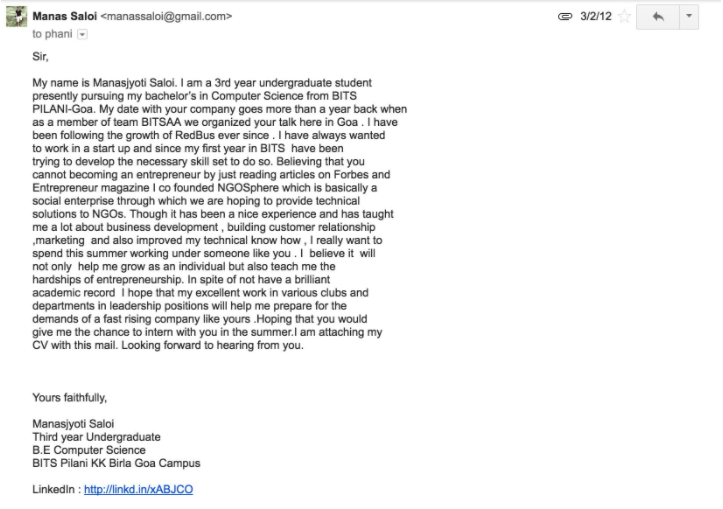
By leadership positions I meant a position at the Student Council as an elected representative from my hostel and being a co-founder of NGOSphere (which I will talk about later in this post). I still got an interview. Showing up something is the only thing you need to do, even if you might thing you are not there yet.

Shankar Prasad, the COO, told me that RedBus was exploring expansion in the North East. They had started operations almost a year before, but they had very few tie ups and hence wanted someone to go there. My work was to convince bus operators & travel agencies to partner with RedBus, scale up RedBus’s operations and run a few marketing projects. I don’t know why they felt that I was the guy who could do that, but I was still thankful and jumped at the opportunity.
Learnings:
-
I realised how much I loved working for a fast paced startup which was in hyper scaling mode. There was no bureaucracy. You did not have to please your manager and could just go out and do your own stuff.
-
I never felt like a lowly paid intern. I was hustling in the North East, trying to figure out a way to grow RedBus there. I studied the travel industry in and out.
-
In the 3 months I was with Redbus I helped double their partners in the North East. Even then I was looking at unique ways I could be valuable for a corporation. Being from the North East helped. I realized that if everything fails in my life, I could still become a city manager for some startup in Guwahati. I got solid recommendations and learnt a lot, something I could never had done at a big corporation.
-
I Learnt a lot about how culture is important for a startup. At RedBus, Phani (the CEO) used to send Happy Birthday mails to employees. My manager Subhobrata did his best to let me have the freedom to do what I wanted. Even if I was just there just for 3 months, I felt like I was part of the company. People were quick to praise your work and make you feel important.
NGOSphere
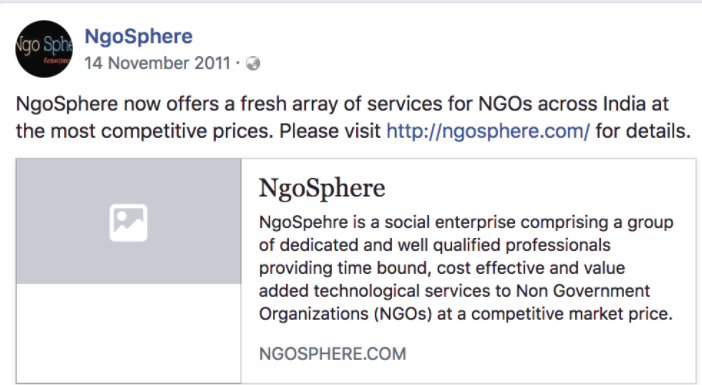
This was our announcement post on Facebook. We were happy to have our own startup. We were vain. And naive. But we tried.
During my 2nd year of college I got fascinated with the world of startups. This was the beginning of the startup boom in India. Everywhere I turned, I could see people starting up. Also maybe, I was reading too much TechCrunch.
Here was the idea: There were around 2 million NGOs in India in 2011. Our goal was to get at least 1% of them online. Provide them various services: web site development, brochure design, fund raising, branding. Our goal was to start a web design agency and target only this market.
Learnings:
-
Finding a datapoint like 2 million NGOs are in India means nothing. We were stupid to assume most of them want to come online and the only thing lacking was a push by us
-
Most NGOs in India are just tax avoidance scams. They don’t care whether people know about them or not
-
Even if you manage to convince a few of them to work with you, they will bail at the last minute. The typical excuse would be lack of funds, directors thought otherwise and were no longer interested
-
Market validation is really important. We assumed NGOs would use the brand presence to raise more funding. We assumed NGOs would be willing to pay us for digital services. Golden rule of starting up: Never assume. Talk to potential customers. See if they are willing to pay
-
We were more interested in getting our visiting cards printed, updating our Linkedin bio. I promised never to do something again in life just because it was the “cool” thing to do. It was a humbling experience, getting rejected by so many people
-
Thankfully something good came out of it: I learnt a lot of lessons which helped me do well in the RedBus internship and later move to a product role. Another co founder started Halaplay and is doing quite well
KonyLabs and Kore.ai
Depending on college placements was the stupidest mistake I made. I was hoping some fast growing startup would come to college and offer me some Business Development or Marketing position. I was not that keen on moving to a developer role. Coding never excited me in college, and I did not know then that something like product management existed. I did not even interview for most of the software companies which came in the beginning of placement season. Only after almost the entire placements were done, I realised what a mistake I had made; with a 6.0 (/10) CGPA I was in deep waters. I had not applied anywhere off campus too. I was running out of options.
So I did what any sane guy at my situation would do: Read Cormen (textbook on Data Structures) cover to cover and started sitting for interviews.
I still kept getting rejected (messing up in the final rounds of a few companies) and was one of the last guys in my Computer Science batch to get placed. It was a humbling experience. My father would call me every night asking when Microsoft/Google is coming and I had to remind him again and again that with my CGPA I was not even eligible to sit for their interviews.
I finally got placed in a startup called Kony Labs. I joined their team which used Kony Studio (their proprietary platform) to build apps for various companies.The advantage of Kony Studio is that it can generate builds for multiple platforms from a single JS codebase. I wrote about my interview experiences here: Want To Work For An Indian Startup? Here’s What You Need to Do.
I worked at KonyLabs for just 2 months before joining Kore, which spun out from the company. It had the same management team and their goal was to build the next generation workplace collaboration platform. It was the best decision I made. Instead of being one of the 100s of developers I was not part of a small startup where I could learn faster. I would go on to work on the Android app before moving to the Server team.
Learnings:
-
Most things in life boils down to luck. I could have remained at Kony and kept working on their proprietary platform. It would not have helped me a lot career wise. But due to some random selection I ended up being one of the few freshers moved to Kore.ai
-
Working at Kore was fun mostly, but with periods of extreme frustration. I felt we were moving too slow and needed to ship much faster if we wanted to have any chance against Slack. Speed is indeed something which can make or break early startups. There was no north star to speak of.
-
Worked under an amazing Tech lead. I understood why they say the effective Tech Lead is a 100x engineer. I learnt a lot during my time at Kore. I had no clue about APIs before I joined Kore. I did not know the difference between SOAP and REST properly. One and a half year of writing code helped me learn how to actually roll up my sleeves and build products myself. It also helped me become more emphatic later as a PM, having been a dev myself.
-
I realised I could never become a good enough dev to work at Google or Amazon. Instead of reading tech blogs I spent far more time reading product development blogs. If I could not finish my work, I would just go home and have a sound sleep, without being up all night figuring out the fix.
CouponDunia
While I was at Kore, I received this time capsule I had set in 2012. This capsule was from a mediocre college student who wanted his future self to answer this simple question: “Did you make something good out of your life or are you still getting screwed?”
I realised that even though I could continue at Kore, working as a developer, I did not see myself as a coder 10 years down the line. So I thought “why waste any more time?”
I told my manager that I was quitting and put in my papers. I had a 2 months notice period and in the worst case I was willing to go back to being a dev. Or maybe I could just join a startup as a Product Management intern? I was willing to take the risk. I had been thinking about the switch for a long time and I knew I would just keep thinking about it and not do anything if I was not pushing myself hard enough and showed enough intent. And what is the best way to show intent than quitting your safe job without a new job offer!

The time capsule which changed my life. Literally.
Instead of writing on how I prepared for Product Management interviews in particular I am linking some really good resources here:
Interviewing for Big Logos with GoogleX former Product Manager.
How to Prepare for a Product Manager Interview by former Facebook PM.
You can also go through all the Product School videos. Also read Crack the PM Interview book.
I have also already written on how to look for startup jobs. I followed the exact same approach. Kept pitching to CEOs/Head of Products on how I can add value. Being a generalist really helped to get a foot in the door. But a lack of prior product experience led to a lot of rejections too. Finally I interviewed with 2 startups- CouponDunia and Zoomcar.
I had connected with Sameer, the CEO of CouponDunia on Angellist and I sent my pitch to him.
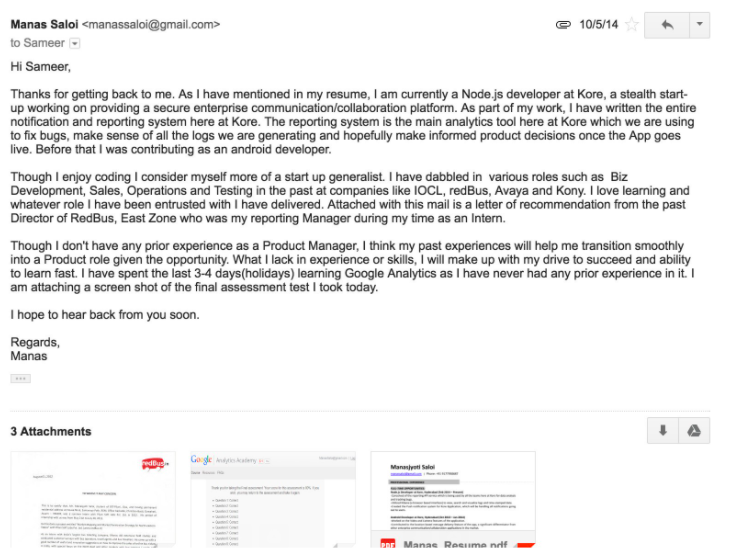
CouponDunia pitch
The answer to why I wanted to move to a Product role:

Why Product manager?
I wrote a long product critique of the app as well as the website. I even found broken links. I had seen how people apply at companies without even using their products. I wanted to show that I cared about the company. I had invested enough time to understand the market as well as the existing products. All I wanted now was a chance.
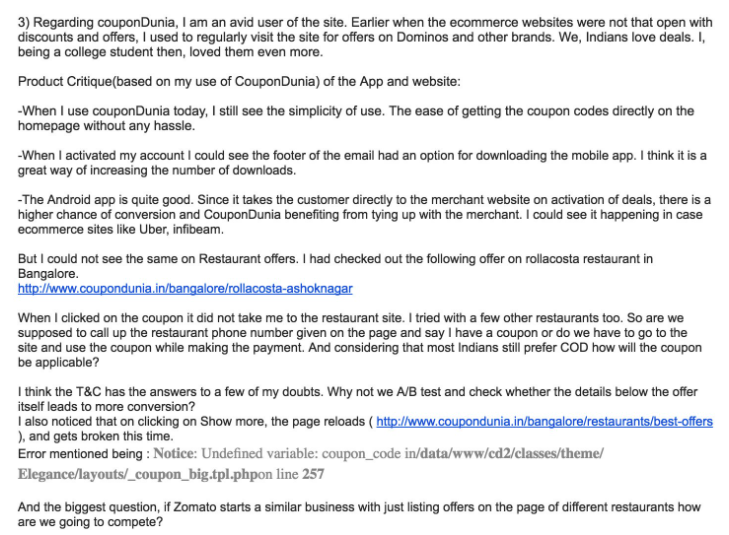
Product Critique of the CD app and website
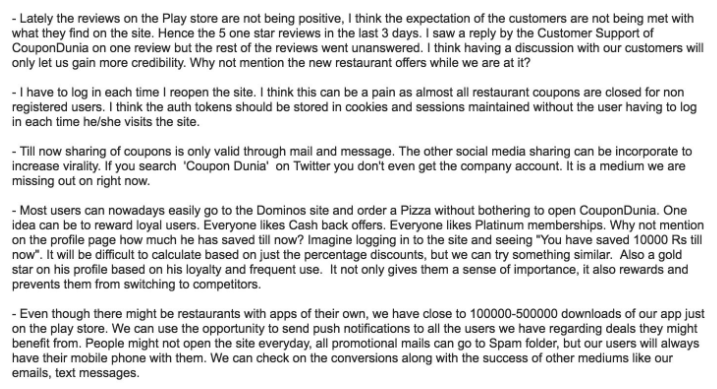
More ideas to grow the usage
Learnings:
-
I have already written about my work at CouponDunia. If you are interested you can read this: How We Scaled CashBoss To 500K downloads in 5 months and Farewell CouponDunia…
-
About transitioning to a Product role: 19 lessons I learned during my first year as a Product Manager.
Craftsvilla
I was loving my life at CouponDunia. I had a boss who liked me, who gave me the freedom to do whatever I wanted. But I also realised that I was getting too comfortable in my life/career. I was no longer learning as much. I had scaled CashBoss to 1million installs and profitability but if we were to reach the next level, we would need a far bigger investment in Marketing.
I was also seriously contemplating switching to one of the “Rocket Ships”. People suggest you to jump into one, no matter what role you get. I was helping a few other startups during this time including one which eventually got acquired by Quikr.
It was during that time Craftsvilla reached out to me. It was supposed to be a random coffee meet with the VP of Product but things turned out for the good and I got a job offer. The following points made the role really exciting:
-
Craftsvilla was one of the fast growing rocketships you read on various startup blogs. Funded by top investors it had raised a massive round at a valuation of around 200 mil and there were talks about a listing on NASDAQ.
-
One of my long term goals then was to move into VC after getting enough startup experience. I thought this would be a good opportunity to work and network with people in the industry. Almost all the VPs at Craftsvilla were ex VCs.
-
Lastly my role: I was being offered the chance to head mobile apps which seemed too good of a role to refuse.
I talked about ways to demonstrate value earlier. Even before I officially joined Craftsvilla, I started working on growth. Thinking about how to make Craftsvilla the next unicorn was all I could think of.
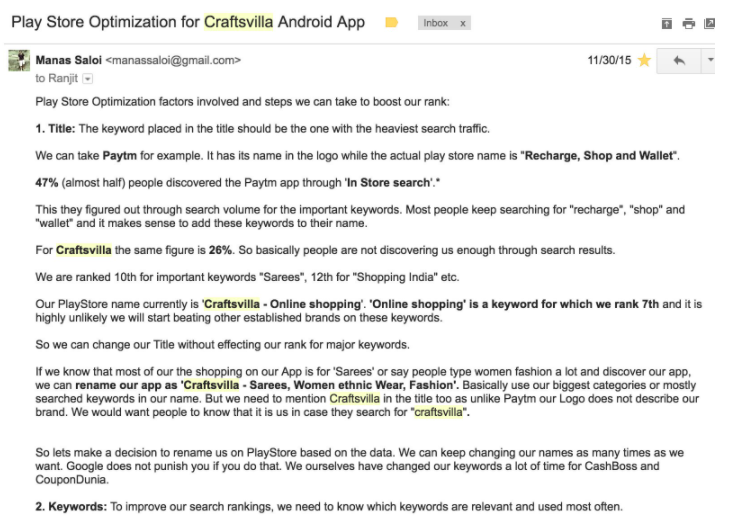
Always be ready to contribute and demonstrate value as early as possible
Learnings:
-
Learnt how to make decisions with data. Every feature you pitch at Craftsvilla had to be backed with metrics and every release supposed to improve on Conversion.
-
Got domain knowledge of the e-commerce industry; from logistics to category management to merchandising.
-
Understood how highly funded VC funded startups work from the inside.
-
By the end of 9 months I had a sad realisation: Most of the people I enjoyed working with had left due to various issues. The Indian startup ecosystem was in turmoil. Every day you could see startups shutting down. Raising new rounds was becoming harder by the day. And Indian e-commerce sector is still in its infancy. Customer retention is hard. Every one is just burning money to retain people who wont think twice before shopping at your competitor for a 10% extra discount. Even the market leader Flipkart is still bleeding losses.
Directi
I spent the next 3 months at home. For a change I did not have to respond to mails asking why conversion dropped by 20% on a Sunday afternoon. I met quite a few startups (based in Guwahati). It was good fun but time was running out. I needed to look for a job again.
I evaluated my options. I did not want to join another e-commerce company unless it was a market leader. Chat platforms were becoming huge. Lot of interesting companies working in the space. I had read like 100 blogposts on Wechat already.
So I decided to apply to the only two companies in India working on Chat: Hike and Flock. I wrote a 10 pager on how to take Hike to the next level and sent it to their Head of Growth. I also dropped a mail to Bhavin, the CEO of Directi.
Fun fact: When I say I hope this somehow lands in your inbox I meant it literally. I normally don’t go through the typical HR route and just reach out to the Hiring manager/Head of Product/ CEO with a value proposition mail. And I sure as hope it lands on their Inbox and not the spam folder.
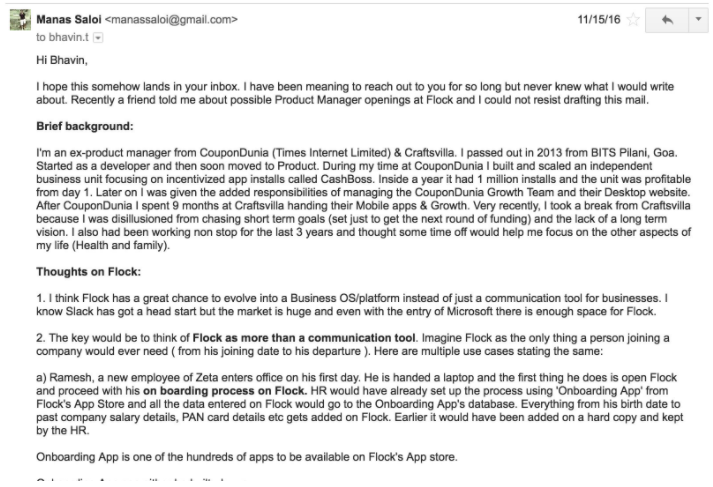
first part of the mail/pitch
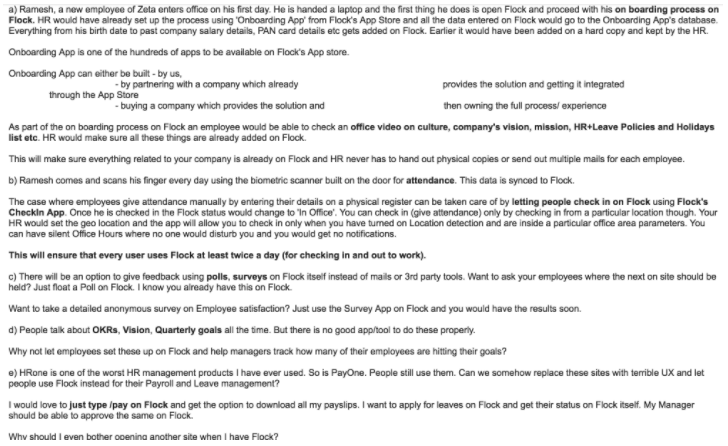
a bunch of product ideas
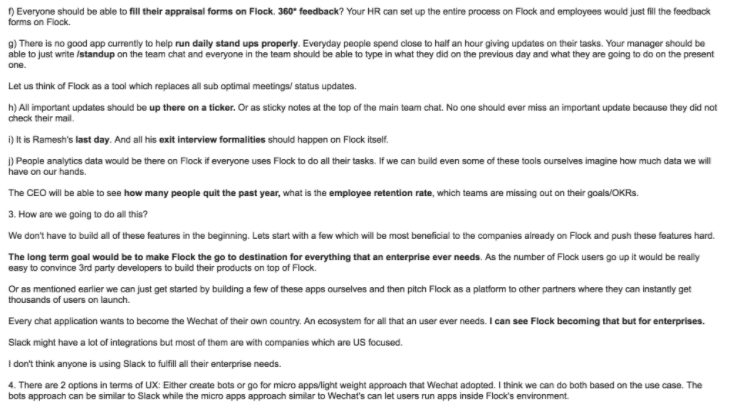
invoking wechat spirit
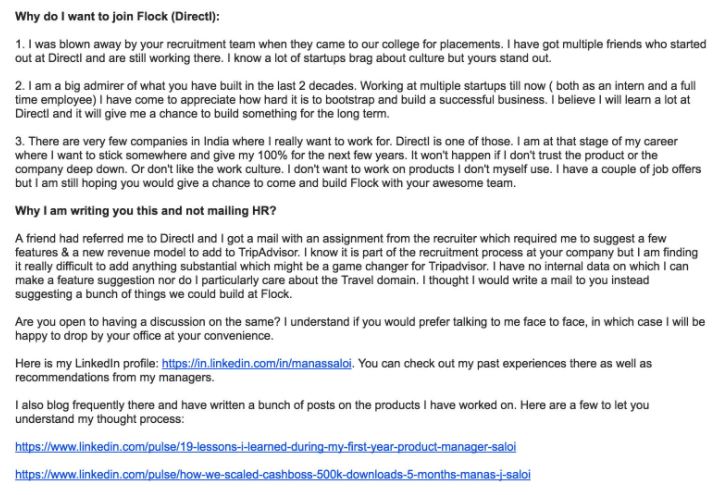
Always explain the ‘why’
I managed to get into Directi and join their Apps team. I have been working on exactly the same things I mentioned in the mail. There have been pros as well as cons but there won’t be a retrospective section for Directi for now.
That’s all folks!
Why I wrote this?
I know there is no point writing a retrospective for your career when it has not even been 5 years since you passed out of college. This might even look narcissistic somehow. But I did end up doing a lot of things in my life over the last few years which I wanted as a teenager in college. I did not go to any MBA school. I worked at various promising startups and gave my best (till I could, and then moved on). I hope this inspires someone who is still at college and wondering whether they can ever find modest level of professional success.
This also answers how I got into Product.
Thanks for reading.